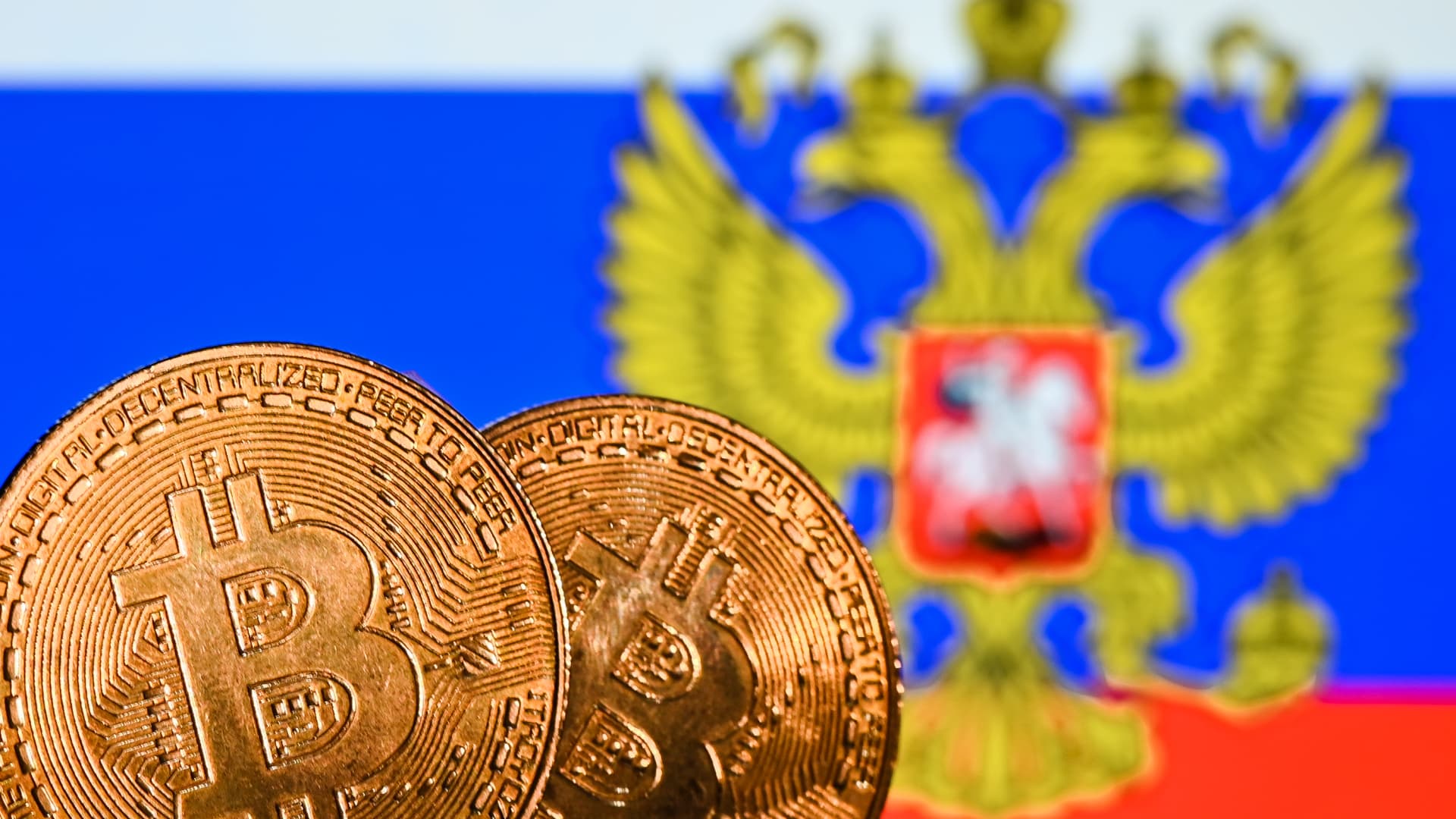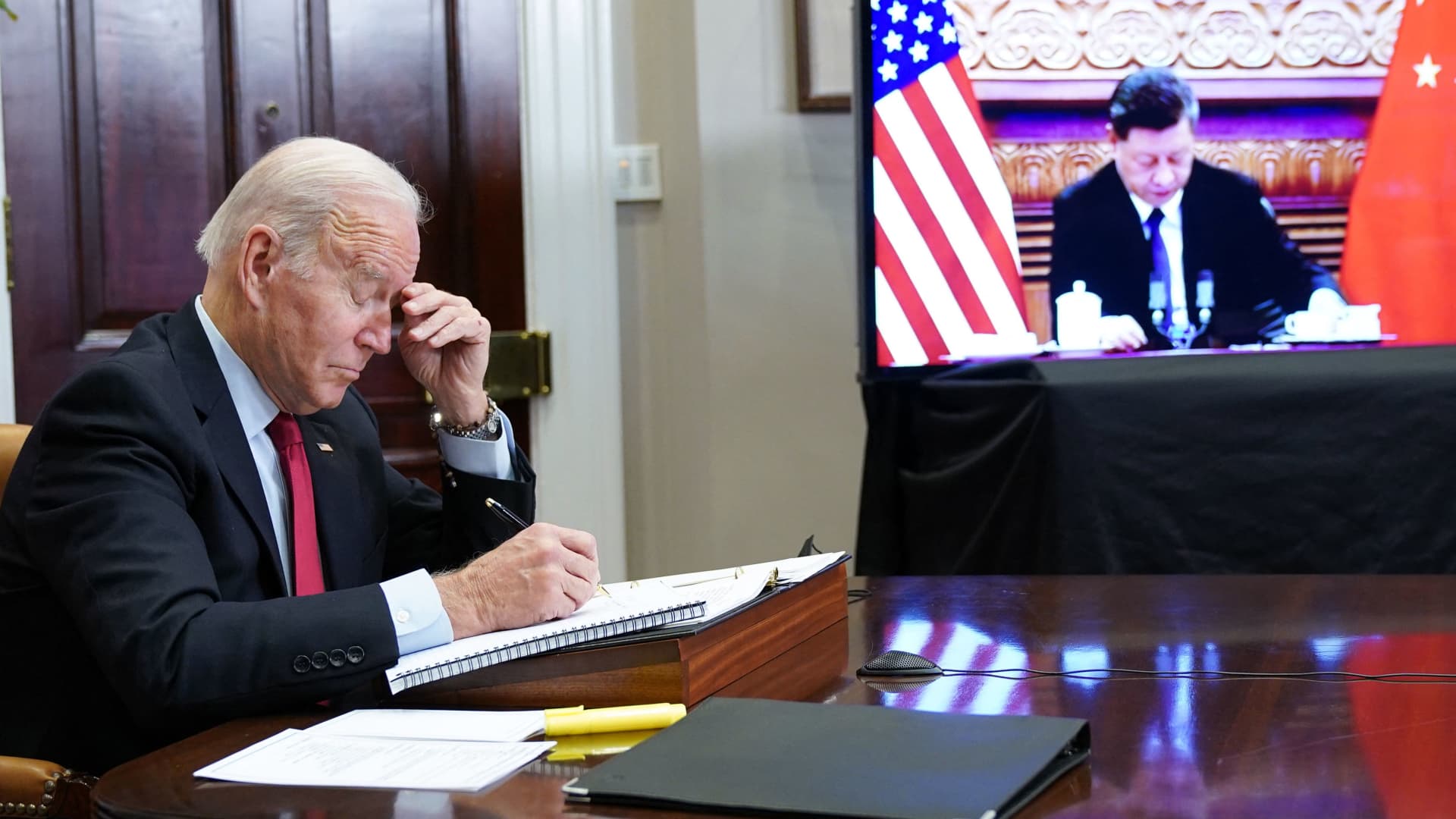Cryptocurrency group lobbies Congress against bills that target Russian oligarchs
The cryptocurrency industry is lobbying against legislation that targets sanctioned Russian corporate giants and oligarchs.

Illustrative image of two commemorative bitcoins seen in front of the national flag of Russia displayed on a computer screen.
Artur Widak | Nurphoto | Getty Images
The cryptocurrency industry has been quietly lobbying U.S. lawmakers against legislation designed to prevent Russian oligarchs from using digital currencies to evade sanctions imposed on Russian President Vladimir Putin's allies and their companies following Russia's attack on Ukraine.
The Blockchain Association, a lobbying group that represents more than 70 crypto platforms including Ripple, Crypto.com and Dragonfly Capital, is trying to convince Congress that cryptocurrencies aren't being used by wealthy Russians to to avoid sanctions. It's working with lobbying shop Forbes Tate Partners against legislation that would impose sanctions on already penalized Russians who are aiming to use crypto as a way to avoid sanctions. The bill would also empower the Treasury Secretary to block crypto trading platforms based in the U.S. from doing business with those in Russia.
Two bills have been introduced in U.S. House and Senate that gives the Biden Administration the authority to prohibit U.S. crypto exchanges from processing payments from Russia. It would also allow U.S. authorities to sanction foreign exchanges that process transactions by sanctioned Russian people or companies.
The legislation poses a grave threat to the industry, which critics say has become popular for clandestine transactions because they cannot be traced. It would essentially subject digital currencies to some of the same rules that require federally insured banks to know their customers, combat money laundering and report suspicious transactions to regulators.
The group says it's helping Congress "separate fact from fiction on the inability of Russia to transfer large sums of money via crypto transactions in order to evade sanctions," Curtis Kincaid, the group's spokesman, said in an email. A Forbes Tate Partners representative declined to comment, referring CNBC to the Blockchain Association for questions.
The crypto industry has stepped up its lobbying efforts as the Biden administration takes a hard look at whether and how to regulate digital assets. President Joe Biden signed an executive order in March calling on regulators to examine the risks and benefits of cryptocurrencies.
The Blockchain Association spent $460,000 on its own in-house lobbyists during the first quarter, a record amount since it launched in 2018, lobbying disclosure records show. The crypto lobbying shop said last year it received over $4 million donations from three crypto giants: Digital Currency Group, Kraken and Filecoin Foundation.
The group is lobbying the Russian Digital Asset Sanctions Compliance Act, according to its first-quarter report. The House bill would target Russians and their affiliated companies who try to use cryptocurrency to get around their own sanctions. Crypto industry leaders say the digital currencies can't be used to evade sanctions.
Some lawmakers, however, say digital currencies should be regulated the same as a bank since the industry pitches itself as an alternative banking system. The U.S. has sanctioned a plethora of Russian-based financial institutions, including the country's central bank. The Treasury Department recently took aim at bitcoin miners operating in Russia.
"The crypto industry fancies itself as an alternative financial system, an alternative bank. Banks have been sanctioned left, right and center and banks are pulling out of Russia," Rep. John Garamendi, D-Calif., who is a cosponsor of the House bill, told CNBC in a recent interview. "So if they fancy themselves a financial mechanism, then they're in the same league, the same situation, as Bank of America or a Russian bank."
The group is also lobbying on the accompanying bill sponsored by Sen. Elizabeth Warren, D-Mass., in the Senate, according to its first-quarter lobbying disclosure report. The bill, titled the Digital Asset Sanctions Compliance Enhancement Act of 2022 and with an almost identical name as the one introduced by Democrats in the House, is also designed "to impose sanctions with respect to the use of cryptocurrency to facilitate transactions by Russian persons subject to sanctions," according to a summary of the bill.
Warren, who is a member of the powerful Senate Finance and Banking committees, recently told National Public Radio that the bill is supposed to give the Treasury Department the tools to step up its oversight of crypto platforms.
"Russian oligarchs can continue to use crypto to move their money around. So we're just going to give Treasury the authorization to treat these crypto platforms much like the banks are treated. That is, you've got to know your customer and you can't be dealing with people who are in violation of sanctions," Warren said during the interview last month.
Warren accused the crypto industry of undermining U.S. national security and the sanctions against Russia.
"It's no surprise that the unregulated crypto industry has deep pockets and an army of lobbyists who are fighting against basic rules to keep consumers safe, but it's shocking that they would also work to undermine U.S. national security and our sanctions regime against Russia," Warren said in an emailed statement.
The Mortgage Bankers Association, an advocacy group for the mortgage finance industry, similarly lobbied against the Klepto Act, a bipartisan bill backed by Warren, along with Sens. Whitehouse, D-R.I., Bill Cassidy, R-La. and Roger Wicker, R- Miss, according to the group's first-quarter report. A representative for the Mortgage Bankers Association did not return a request for comment.
The legislation is designed to expose the real estate holdings "of oligarchs, kleptocrats, and international criminals hidden in the United States, strengthen U.S. anti-money laundering safeguards, and arm law enforcement with the information required to track down kleptocrats' luxury assets in the U.S. financial system," according to a press release.

 ShanonG
ShanonG 

























.jpg&h=630&w=1200&q=100&v=f776164e2b&c=1)





